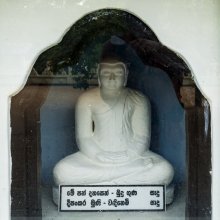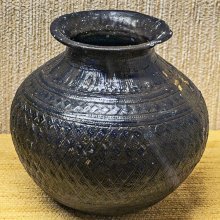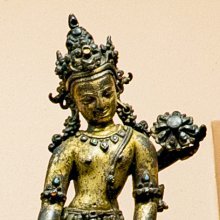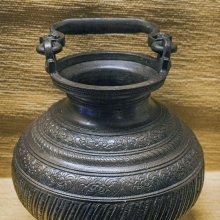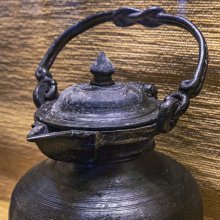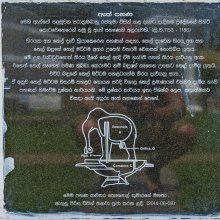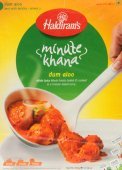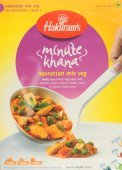Pan, Paṇ, Paṉ, Pāṉ, Panne: 16 definitions
Introduction:
Pan means something in Hinduism, Sanskrit, the history of ancient India, Hindi, biology, Tamil. If you want to know the exact meaning, history, etymology or English translation of this term then check out the descriptions on this page. Add your comment or reference to a book if you want to contribute to this summary article.
Images (photo gallery)
(+1 more images available)
In Hinduism
Ayurveda (science of life)
Source: gurumukhi.ru: Ayurveda glossary of termsPāṇ (पाण्):—Hand, Arm

Āyurveda (आयुर्वेद, ayurveda) is a branch of Indian science dealing with medicine, herbalism, taxology, anatomy, surgery, alchemy and related topics. Traditional practice of Āyurveda in ancient India dates back to at least the first millenium BC. Literature is commonly written in Sanskrit using various poetic metres.
Vaishnavism (Vaishava dharma)
Source: academia.edu: Dvādaśa-mūrti in Tamil TraditionPāṇ (பாண்) refers to one of the twelve Āḻvār saints of Tamil Nadu (India), according to the Āṟāyirappati-Kuruparamparāprapāvam (pp. 8-101).

Vaishnava (वैष्णव, vaiṣṇava) or vaishnavism (vaiṣṇavism) represents a tradition of Hinduism worshipping Vishnu as the supreme Lord. Similar to the Shaktism and Shaivism traditions, Vaishnavism also developed as an individual movement, famous for its exposition of the dashavatara (‘ten avatars of Vishnu’).
India history and geography
Source: Shodhganga: Vernacular architecture of Assam with special reference to Brahmaputra ValleyPan (in English “betel leaves”) refers to Piper betle.—It appears in the study dealing with the vernacular architecture (local building construction) of Assam whose rich tradition is backed by the numerous communities and traditional cultures.

The history of India traces the identification of countries, villages, towns and other regions of India, as well as mythology, zoology, royal dynasties, rulers, tribes, local festivities and traditions and regional languages. Ancient India enjoyed religious freedom and encourages the path of Dharma, a concept common to Buddhism, Hinduism, and Jainism.
Biology (plants and animals)
Source: Wisdom Library: Local Names of Plants and DrugsPan [पान] in the Hindi language is the name of a plant identified with Piper betle L. from the Piperaceae (Pepper) family having the following synonyms: Piper chawya, Piper malamiris, Piper densum. For the possible medicinal usage of pan, you can check this page for potential sources and references, although be aware that any some or none of the side-effects may not be mentioned here, wether they be harmful or beneficial to health.
Pan [पान] in the Nepali language, ibid. previous identification.
Pan [ꯄꯥꯟ পান] in the Manipuri language is the name of a plant identified with Colocasia esculenta (L.) Schott from the Araceae (Arum) family having the following synonyms: Alocasia illustris, Alocasia dussii.
Source: Google Books: CRC World Dictionary (Regional names)1) Pan in India is the name of a plant defined with Areca catechu in various botanical sources. This page contains potential references in Ayurveda, modern medicine, and other folk traditions or local practices It has the synonym Areca faufel Gaertn. (among others).
2) Pan is also identified with Colocasia esculenta It has the synonym Steudnera virosa (Roxb.) Prain (etc.).
3) Pan in Philippines is also identified with Sesbania grandiflora It has the synonym Aeschynomene coccinea L.f. (etc.).
Example references for further research on medicinal uses or toxicity (see latin names for full list):
· Encyclopédie Méthodique, Botanique (1806)
· Prodromus Florae Novae Hollandiae (1810)
· Species Plantarum.
· Journal of Cytology and Genetics (1995)
· Acta Botanica Austro Sinica (1989)
· Taxon (1979)
If you are looking for specific details regarding Pan, for example side effects, diet and recipes, extract dosage, pregnancy safety, health benefits, chemical composition, have a look at these references.

This sections includes definitions from the five kingdoms of living things: Animals, Plants, Fungi, Protists and Monera. It will include both the official binomial nomenclature (scientific names usually in Latin) as well as regional spellings and variants.
Languages of India and abroad
Sanskrit dictionary
Source: DDSA: The practical Sanskrit-English dictionaryPaṇ (पण्).—I. 1 Ā. (paṇate, paṇita)
1) To deal in, barter, purchase, buy; विततं वणिजापणेऽखिलं पणितुं यत्र जनेन वीक्ष्यते (vitataṃ vaṇijāpaṇe'khilaṃ paṇituṃ yatra janena vīkṣyate) N.2.91.
2) To bargain, transact business.
3) To bet or stake at play (usually with gename of the thing staked, but sometimes with acc.); प्राणानामपणिष्टासौ (prāṇānāmapaṇiṣṭāsau) Bhaṭṭikāvya 8.121; पणस्व कृष्णां पाञ्चालीम् (paṇasva kṛṣṇāṃ pāñcālīm) Mb.
4) To risk or hazard (a battle).
5) To win anything at play. -II. 1 Ā., 1 U. (paṇate, paṇāyati-te) कोटिभिः पणते नित्यं तस्य राष्ट्रे वणिग्जनः (koṭibhiḥ paṇate nityaṃ tasya rāṣṭre vaṇigjanaḥ).
1) To praise.
2) To honour; यक्षाश्चापि पणायन्ति तद्विभूतिं गृहे गृहे (yakṣāścāpi paṇāyanti tadvibhūtiṃ gṛhe gṛhe). -With वि (vi) to sell, barter; आभीरदेशे किल चन्द्रकान्तं त्रिभिर्वराटैर्विपणन्ति गोपाः (ābhīradeśe kila candrakāntaṃ tribhirvarāṭairvipaṇanti gopāḥ) Subhāṣ.
--- OR ---
Pan (पन्).—1 U. (panāyati-te, panāyita or panita)
1) To praise, extol; cf. पण् (paṇ).
2) (Ātm.) To rejoice at, be glad of.
Source: Cologne Digital Sanskrit Dictionaries: Shabda-Sagara Sanskrit-English DictionaryPaṇ (पण्).—[paṇa] r. 1st cl. (paṇate) also 10th. cl. (paṇayati) 1. To negociate, to treat or transact business. 2. To bet or stake at play. (paṇāyati) To praise. vyavahāre stutauca bhvā0 ā0 saka0 seṭ .
--- OR ---
Pan (पन्).—[pana] r. 1st. cl. (panāyati) To praise: this root and paṇa in the same sense, take āya before the Sarvadhatuka, and some of the Arddhadhatuka, affixes. (panate) To traffic, to buy and sell: see paṇa. stutau bhvā0 ātma0 saka0 seṭ . svārthe āya vā tatra ātma0 .
Source: Cologne Digital Sanskrit Dictionaries: Benfey Sanskrit-English DictionaryPaṇ (पण्).— (for original par + ṇā, ii. 9 of par; cf. [Old High German.] feil), i. 1, [Ātmanepada.] (in epic-poetry also [Parasmaipada.]), 1. To buy, Mahābhārata 13, 4564. 2. To play, Mahābhārata 3, 3047. 3. To stake (at play), to bet, Mahābhārata 2, 2144. 4. To stake on, 9, 3258. 5. To risk. Ptcple. of the pf. pass. paṇita, Betting, 1, 1225. n. A bet, 1226. Ptcple. of the fut. pass. paṇya, Saleable, [Mānavadharmaśāstra] 8, 398. n. Ware, 5, 129. Comp. Kara-, n. ware offered as tribute, Mahābhārata 2, 1052. Masi-, m. a scribe. Yathāpaṇya + m, adv. according to the value, [Mānavadharmaśāstra] 8, 398.
— With the prep. vi vi, 1. To sell, [Pañcatantra] i. [distich] 88. 2. To bet, Mahābhārata 1. 1191.
--- OR ---
Paṇ (पण्).— (akin to 1. paṇ), i. 1, [Ātmanepada.], and paṇāya paṇ + āya, [Parasmaipada.] To praise, to honour.
--- OR ---
Pan (पन्).— (cf. paṇ), i. 1, [Ātmanepada.]; base of the pres. panāya, [Parasmaipada.] and [Ātmanepada.] i. 10 panaya, To praise,
Paṇ (पण्).—paṇate (paṇati) [participle] paṇita (q.v.) bargain, barter, buy; bet, wage, stake, risk, play for ([genetive]); win a thing ([instrumental]) from ([accusative]) at play.
--- OR ---
Pan (पन्).—panate [participle] panita be wonderful; admire, praise, commend. [Causative] panayati, te = [Simple] tr.; [Middle] also rejoice at, be glad of ([accusative] or [genetive]).
Source: Cologne Digital Sanskrit Dictionaries: Monier-Williams Sanskrit-English Dictionary1) Paṇ (पण्):—[class] 1. [Ātmanepada] ([Dhātupāṭha xii, 6]) paṇate ([Epic] also ti; [perfect tense] peṇe [grammar]; [Aorist] apaṇiṣṭa, [Bhaṭṭi-kāvya]; [future] paṇiṣyate, ṇitā, [ib.]),
—to honour, praise, [Naighaṇṭuka, commented on by Yāska iii, 14];
—to barter, purchase, buy, [Brāhmaṇa; Mahābhārata];
—to negotiate, bargain, [Āpastamba];
—to bet, stake, lay a wager, play for (with [genitive case] e.g. prāṇā-nām, [Bhaṭṭi-kāvya]; cf. [Pāṇini 2-3, 57.; Kāśikā-vṛtti] or [accusative] e.g. kṛṣṇāṃ [Mahābhārata]);
—to risk or hazard (as a battle), [Mahābhārata];
—to win anything ([instrumental case]) from ([accusative]), [ib.] :—[Causal] paṇayati ([Aorist] apīpaṇat), to negotiate, bargain, [Kāvya literature] (cf. paṇāya and √pan.)
2) Pan (पन्):—[from pad] 1. pan in [compound] before nasals = 3. pad.
3) 2. pan [class] 1. [Ātmanepada] panate ([perfect tense] -papana, papne [Aorist] 3. sg. paniṣṭa), to be worthy of admiration or to admire ([accusative]), [Ṛg-veda] :—[Passive voice] panyate, [ib.] :—[Causal] panayati, te, to regard with surprise or wonder, to admire, praise, acknowledge, [Ṛg-veda];
— ([Ātmanepada]) to rejoice at, be glad of ([genitive case]), [ib.] (cf. √paṇ; paṇāya).
Source: Cologne Digital Sanskrit Dictionaries: Yates Sanskrit-English Dictionary1) Paṇ (पण्):—paṇate 1. d. To transact business. to trade. (ka) paṇayati 10. a. Idem. paṇāyati 10. a. To praise.
2) Pan (पन्):—(ṅa) panate 1. d. To traffic, to buy and sell. (ka) panāyati 10. a. To praise, to celebrate.
[Sanskrit to German]
Sanskrit, also spelled संस्कृतम् (saṃskṛtam), is an ancient language of India commonly seen as the grandmother of the Indo-European language family (even English!). Closely allied with Prakrit and Pali, Sanskrit is more exhaustive in both grammar and terms and has the most extensive collection of literature in the world, greatly surpassing its sister-languages Greek and Latin.
Hindi dictionary
Source: DDSA: A practical Hindi-English dictionary1) Pan in Hindi refers in English to:—(nm) a bet; ~[na] marketing, selling; traffic..—pan (पण) is alternatively transliterated as Paṇa.
2) Pan in Hindi refers in English to:——a suffix added to common and attributive nouns to form abstract nouns (e.g. [ladakapana]); a variant of [pani, pana, panya] and [pamca] in compound formations; ~[gadi] a water-cart; ~[ghata] the periphery of a well etc. where water is drawn; ~[cakki] a water-mill; ~[channa] a strip of wet cloth generally tied on a fresh cut; ~[dubbi] a submarine; ~[dhaumkani] water-bellows; ~[badara] rain and sunshine; ~[badi] a betel-enclosure, a betelgarden; ~[vadi] a betel-seller; ~[sari] one who sells commodities as spices, dry fruits, etc.; ~[sala] a water-kiosk, stand where water is stored and distributed to travellers; of five years; ~[saiya] a small dinghy; ~[seri] a five-seer weight; ~[hara/hara] a water-bearer..—pan (पन) is alternatively transliterated as Pana.
...
Kannada-English dictionary
Source: Alar: Kannada-English corpusPaṇ (ಪಣ್):—
1) [verb] to prepare for a war; to keep one’s army and other preparations ready for a war.
2) [verb] to beready for a war.
3) [verb] to happen; to occur.
4) [verb] to do; to perform (an action); to carry out.
5) [verb] to make; to construct; to build.
6) [verb] to arrange; to scheme or plan for (something).
7) [verb] to decorate; to adorn.
8) [verb] to bring about (as to get a result).
9) [verb] to spread (a net for trapping an animal).
10) [verb] to describe in detail or exaggeratedly.
--- OR ---
Paṇ (ಪಣ್):—
1) [verb] to putforth fruit or fruits.
2) [verb] (a fruit) to become ripe.
3) [verb] (a leaf) to wither (as from old age).
4) [verb] (fig.) to become more (as by growing).
5) [verb] (voice) to become melodious.
6) [verb] to become bright, shiny or lustrous.
--- OR ---
Paṇ (ಪಣ್):—
1) [noun] a ripe fruit.
2) [noun] the state of being old (as a human being from age).
3) [noun] the act or fact of achieving; achievement; success; accomplishment.
4) [noun] ಪಣ್ಣಾಗು [pannagu] paṇṇagu (fruit) to become ripe; 2. (time) to become opportune; 3. to be achieved, accomplished; 4. (the mind) to develop fully; 5. to be satisfied; to have satisfaction; 6. to lose strength, vigour, as from oldage; 7. to shrink (as from shame, modesty, etc.); 8. (hair) to turn grey; 9. (a leaf) to lose green, freshness, and become withered (from age); 10. (one’s attitude) to become softened; to become gentle and tender; to melt; 11. (a pawn in the game of chance played with dice) to reach the central square successfully.
--- OR ---
Paṇṇe (ಪಣ್ಣೆ):—
1) [noun] a great number of people gathered together; a crowd; a multitude.
2) [noun] a farm-land or arable land.
--- OR ---
Pan (ಪನ್):—[noun] (only in comp.) ten.
--- OR ---
Pan (ಪನ್):—[adjective] (only in comp.) having moisture; damp.
--- OR ---
Panne (ಪನ್ನೆ):—[noun] a volatile, crysalline ketone with strong characteristic odour, derived from the wood of camphor tree, used to protect fabrics from moths, and also in worshipping; camphor.
--- OR ---
Panne (ಪನ್ನೆ):—[noun] a lock of hair or hair forming part of the beard on the sides and extending usu. upto the bottom portion of the ears; side-lock.
Kannada is a Dravidian language (as opposed to the Indo-European language family) mainly spoken in the southwestern region of India.
Tamil dictionary
Source: DDSA: University of Madras: Tamil LexiconPaṇ (பண்) noun < பண்ணு-. [pannu-.]
1. (Music) Melody-type; இசை. பண்ணென்னாம் பாடற் கியைபின் றேல் [isai. pannennam padar kiyaipin rel] (திருக்குறள் [thirukkural], 573).
2. (Music) Primary melody-type, heptatonic; ஏழுசுரமுமுள்ள இசை. பண் ணுந் திறனும் [ezhusuramumulla isai. pan nun thiranum] (பெருங்கதை வத்தவ. [perungathai vathava.] 3, 56).
3. Music; இசைப்பாட்டு. (பிங்கலகண்டு) [isaippattu. (pingalagandu)]
4. A stringed musical instrument; யாழ் முதலிய நரப்புக்கருவிகள். பண் கெழுமெல் விரலால் [yazh muthaliya narappukkaruvigal. pan kezhumel viralal] (சீவகசிந்தாமணி [sivagasindamani] 220).
5. A masquerade dance; கூத்துவகை. ((சங்கத்தகராதி) தமிழ்சொல்லகராதி) [kuthuvagai. ((sangathagarathi) thamizhsollagarathi)]
6. Sound; ஓசை. பண்ணமை சிலம்பு [osai. pannamai silambu] (சிலப்பதிகாரம் அரும்பதவுரை பதிகம். [silappathigaram arumbathavurai pathigam.] 18).
7. Saddle for a horse; குதிரைக்கலனை. (பிங்கலகண்டு) பண்ணியல் வயப்திருக்குறள் [kuthiraikkalanai. (pingalagandu) panniyal vayappari] (கம்பராமாயணம் வரைக்காட்சி. [kambaramayanam varaikkadsi.] 13).
8. Decoration; அலங்காரம். பெரிய. திருவடியைப் பண்செய்து [alangaram. periya. thiruvadiyaip panseythu] (ஈடு-முப்பத்தாறுயிரப்படி [idu-muppatharuyirappadi], 6, 2, ப்ர. [pra.]).
9. Trappings of an elephant or horse; யானை குதிரைகட்குச் செய்யும் அலங்காரம். கொய்யுளைமா கொல்களிறு பண்விடுக [yanai kuthiraigadkus seyyum alangaram. koyyulaima kolkaliru panviduga] (புறப்பொருள்வெண்பாமாலை [purapporulvenpamalai] 6, 2).
10. Gait, as of a horse; குதிரை முதலியவற்றின் கதி. பண்ணமர மாச்செலுத்தும் பாகரினும் [kuthirai muthaliyavarrin kathi. pannamara macheluthum pagarinum] (சிவஞான போதம் [sivagnana potham] 10, 2, 4).
11. Fittings and decorations of a car; தேர்க்குச் செய்யும் அலங்காரம். பண்ணமைந்த தேரும் [therkkus seyyum alangaram. pannamaintha therum] (புறப்பொருள்வெண்பாமாலை [purapporulvenpamalai] 9, 26).
12. Fitness, adaptation, good quality, suitableness; தகுதி. [thaguthi.] (W.)
13. Docility, training; அமைவு. [amaivu.] (W.)
14. (Nautical usage) Larboard side of a dhoney; மரக்கலத்தின் இடப் பக்கம். [marakkalathin idap pakkam.] (W.)
15. See பண்கயிறு. [pankayiru.] (W.)
16. Time, season; பருவம். [paruvam.] (W.)
17. Service, work, business, employment; தொண்டு. [thondu.] (W.)
18. Tank; நீர்நிலை. பண்குலவத் தாலமிசை நடித்து [nirnilai. pankulavath thalamisai nadithu] (திருக்குற்றாலத் தல திருநதிச். [thirukkurralath thala thirunathis.] 12). (அகராதி நிகண்டு [agarathi nigandu])
--- OR ---
Paṉ (பன்) noun
1. Bulrush, typha; நாணல் வகை. [nanal vagai.] (J.)
2. Cotton; பருத்தி. (நன். சங்கர. அரும்.) [paruthi. (nan. sangara. arum.)]
3. Square or checker in braiding bulrush; பன்பாயின் பின்னற்சதுரம். [panpayin pinnarsathuram.] (J.)
4. Tooth of a serrated sickle; அரிவாட்பல். (இலக்கியச் சொல்லகராதி) [arivadpal. (ilakkiyas sollagarathi)]
--- OR ---
Pāṇ (பாண்) noun < பண். [pan.]
1. Song, vocal music, melody; பாட்டு. பூணினான்றன் பாண்வலைச் சென்றுபட்டாள் [pattu. puninanran panvalais senrupattal] (சீவகசிந்தாமணி [sivagasindamani] 2040).
2. See பாணாற்றுப் படை. பாணிரண்டு முல்லை. (பத்துப்பாட்டு, முக வுரை). [panarrup padai. panirandu mullai. (pathuppattu, muga vurai).]
3. Pāṇar caste; பாணர்சாதி. மீன் சீவும் பாண்சேரி [panarsathi. min sivum panseri] (புறநானூறு [purananuru] 3, 48).
4. Praise, flattery; இச்சக வார்த்தை. பாண்குலாய்ப் படுக்கவேண்டா [ichaga varthai. pankulayp padukkavenda] (சீவகசிந்தாமணி [sivagasindamani] 2515). கேட்கின்றனகளும் . . . இந்நாட்பாண் [kedkinranagalum . . . innadpan] (நாலாயிர திவ்யப்பிரபந்தம் இயற். திருவிருத்தம் [nalayira thivyappirapandam iyar. thiruvirutham] 8).
5. Submissiveness, humility; தாழ்ச்சி. சிறகாற் புல்லிப் பணிந்து பாண் செய்த தன்றே [thazhchi. siragar pullip paninthu pan seytha thanre] (சீவகசிந்தாமணி [sivagasindamani] 1624).
--- OR ---
Pāṉ (பான்) particle A suffix in a verbal participle, indicating purpose; ஒரு வினையெச்ச விகுதி. [oru vinaiyecha viguthi.] (நன். [nan.] 343.)
--- OR ---
Paṇ (பண்) noun probably from பண்ணு-. [pannu-.] Land, field; வயல். [vayal.] (M. E. R. 12 of 1923.)
--- OR ---
Pāṇ (பாண்) noun < பாழ். [pazh.] That which ruins; பாழாக்குவது. பாதியிலே நீங்குமோ பாண்சனியன் [pazhakkuvathu. pathiyile ningumo pansaniyan] (தெய்வச். விறலிவிடுதூது [theyvas. viralividuthuthu] 377).
Tamil is an ancient language of India from the Dravidian family spoken by roughly 250 million people mainly in southern India and Sri Lanka.
See also (Relevant definitions)
Starts with (+5150): Five Hindrances, Paansula, Pamcababu, Pamcabali, Pamcabhaksha, Pamcabhakshya, Pamcabhisheka, Pamcabhujakriti, Pamcabhuji, Pamcadara, Pamcadashitopu, Pamcadhare, Pamcaga, Pamcagajjaya, Pamcagalu, Pamcagarti, Pamcagatte, Pamcagaula, Pamcaghamte, Pamcagulma.
Ends with (+463): Aatmasamarpan, Abhishaapan, Abhyapan, Abhyarpan, Achchhapan, Adharpan, Akampan, Akarpan, Akelapan, Akkinikkarappan, Akkinipan, Akpaekpan, Alampan, Alapan, Alappan, Alippan, Alokpan, Anantakkarappan, Anantaparpanapan, Anantapatmanapan.
Full-text (+1086): Bhrashtra, Pithara, Paṇya, Paṇaya, Rijisha, Ashtakapala, Panitri, Pan-kuṟuni, Panana, Vipan, Khallika, Prapanika, Agnishtha, Bhanavashi, Mithagara, Panpay, Panu, Angarashakati, Panpattavan, Bhrashtraka.
Relevant text
Search found 148 books and stories containing Pan, Paan, Pāṇ, Paṇ, Paṉ, Pāṉ, Panne, Paṇṇe; (plurals include: Pans, Paans, Pāṇs, Paṇs, Paṉs, Pāṉs, Pannes, Paṇṇes). You can also click to the full overview containing English textual excerpts. Below are direct links for the most relevant articles:
Satapatha-brahmana (by Julius Eggeling)
Kāṇḍa VI, adhyāya 5, brāhmaṇa 2 < [Sixth Kāṇḍa]
Kāṇḍa VI, adhyāya 6, brāhmaṇa 2 < [Sixth Kāṇḍa]
Kāṇḍa VI, adhyāya 5, brāhmaṇa 4 < [Sixth Kāṇḍa]
The Skanda Purana (by G. V. Tagare)
Chapter 267 - Importance of Tulāpuruṣadāna (Tulāpuruṣa-dāna) < [Section 1 - Tīrtha-māhātmya]
Chapter 19 - Greatness of Pitṛkūpikā Tīrtha < [Section 1 - Tīrtha-māhātmya]
Chapter 2 - The Benefit of Different Kinds of Charitable Gifts < [Section 7 - Vaiśākhamāsa-māhātmya]
Trishashti Shalaka Purusha Caritra (by Helen M. Johnson)
Appendix 1.6: New and rare words < [Appendices]
Appendix 2.3: new and rare words < [Appendices]
Appendix 4.2: New and Rare Words < [Appendices]
Vinaya Pitaka (3): Khandhaka (by I. B. Horner)
The story of an thief with a “wanted” notice < [1. Going forth (Pabbajjā)]
The Religion and Philosophy of Tevaram (Thevaram) (by M. A. Dorai Rangaswamy)
Volume 3 - Introduction to the third volume
Nayanar 7: Amaraneedi (Amarniti) < [Volume 4.1.1 - A comparative study of the Shaivite saints the Thiruthondathogai]
Nayanar 50: Ninra Seer Nedumaara (Ninracir Netumara) < [Volume 4.1.1 - A comparative study of the Shaivite saints the Thiruthondathogai]
Tiruvaymoli (Thiruvaimozhi): English translation (by S. Satyamurthi Ayyangar)
Pasuram 5.9.6 < [Section 9 - Ninth Tiruvaymoli (Man ey nokku)]
Pasuram 3.8.6 < [Section 8 - Eighth Tiruvaymoli (Mutiyane)]
Pasuram 2.8.11 < [Section 8 - Eighth Tiruvaymoli (Anaivatu Aravu-anaimel)]
Related products
(+19 more products available)
